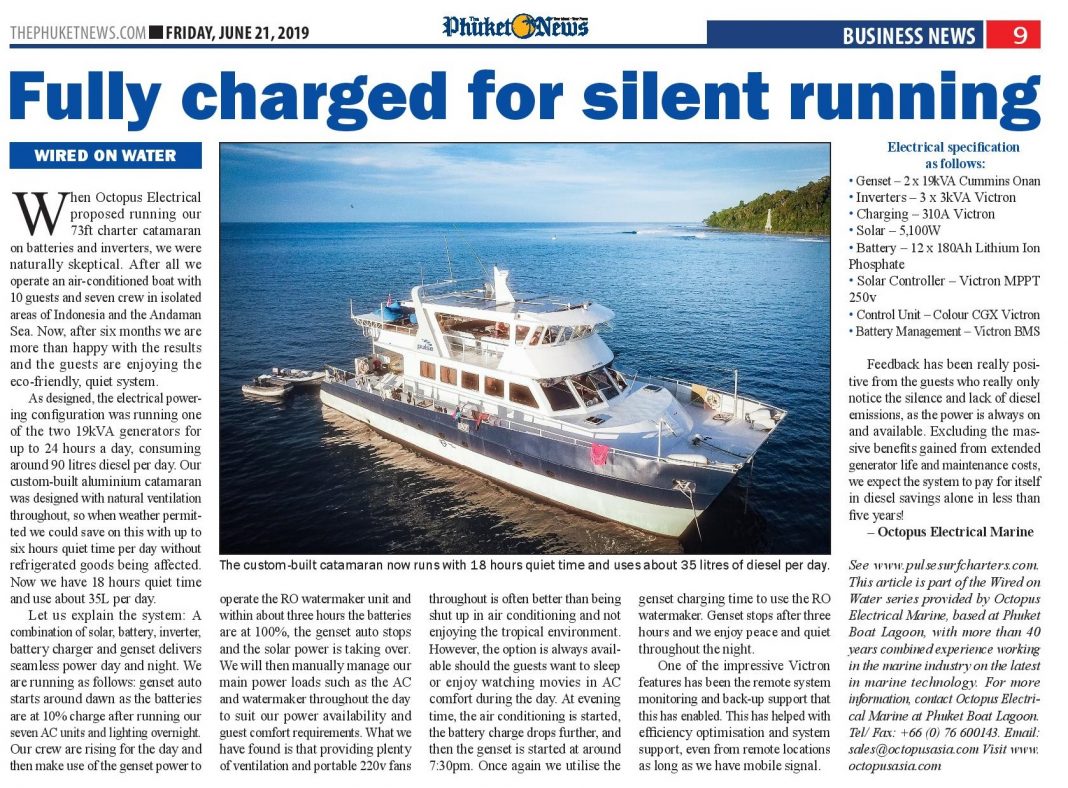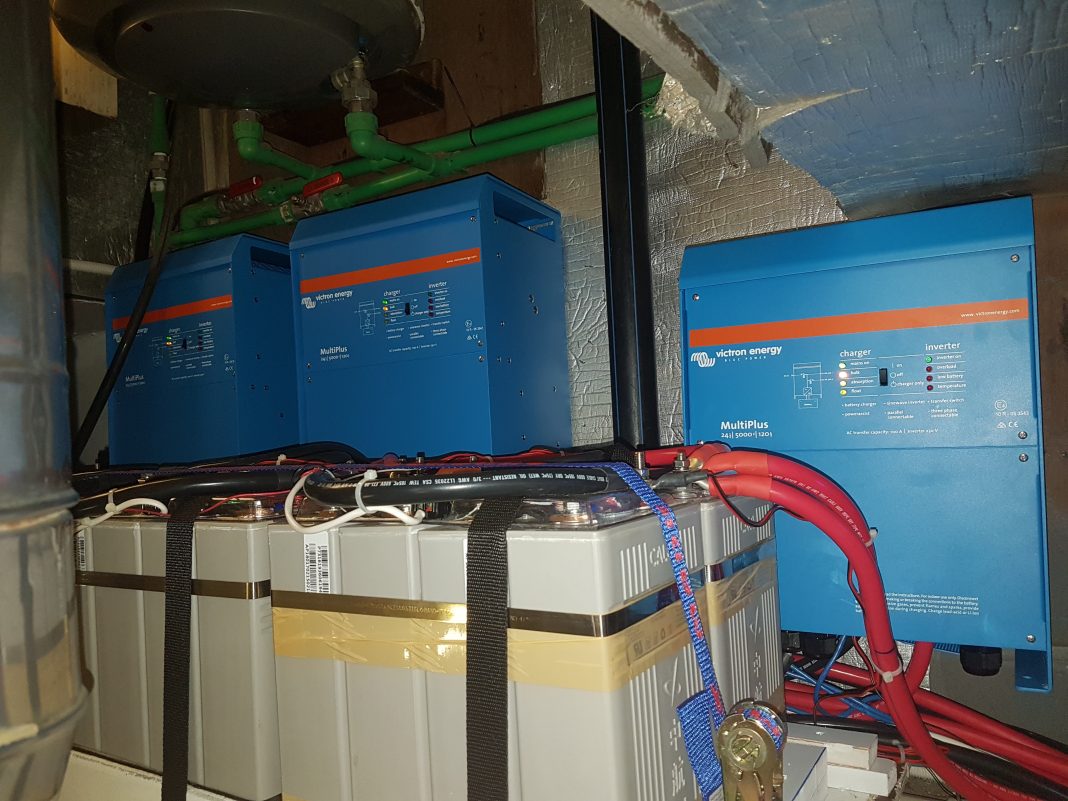When it comes to inverter vs generator or even the new Hybrid combined systems for marine/off-grid usage and now the possibility also of having both being a inverter system running most items then a generator Auto-starts to bring the generator online for even higher loads and to recharge the battery when needed ( this also reduces the generator run times by up-to 80% depending on selections, you even get to have remote monitoring of the electrical systems from any-ware (including stopping and starting the generator)
Many customers get confused about what is right for them . Although there is a difference between inverter and generator, most people don’t fully understand that – and the new inverters we have now can run all the appliances including Air conditioners and other high power electrical items. While generators produce electrical power, inverters basically convert DC current to AC current. Both can be used at the same time or independently , but deciding which is better, generator or inverter, depends on a number of factors.
Before we proceed to evaluate the pros and cons of a domestic use fuel-based generator versus a battery inverter set, let us understand some of the principles behind the working of these two.
Principle
Diesel-run Generator (DG)
Inverter/Charger
Storage
A generator does not store electricity; but as the name suggests, it generates electricity once started. So, it needs to be started first and only then will it provide power. Obviously, there will be a time lag between starting and receiving back-up power once utility supply fails.
A power inverter set does store power in the batteries in the form of direct current (DC). It first converts alternating current (AC) from the Generator/Grid during charging and stores it immediately reconverting it to AC to run your appliances. There is no time-interval and no manual starting either. and no limit to the output size
Energy
A generator generates electricity. It is a mechanical device that converts the calorific value of diesel into electrical energy using rotating devices.
An inverter system only stores and reconverts energy. When DC power is converted into AC electricity, the result is an unvarying electrical signal. Properly filtered, it has the same characteristics as perfect alternating current..
Weight
Unless your power requirement is small (IE only domestic lighting and household appliances etc), a DG set can be heavy and bulky, requiring a metal frame and wheels. Technically, they are portable, but they lack the convenience factor.
An inverter is not a bulky, heavy device per say, but it works only along with a set of connected batteries. These new Style LiFeP04 batteries are now 1/4 the size and double the stored power of the old style Lead Acid Batteries
Maintenance
Generators work on diesel or gasoline to produce energy. They require dedicated maintenance with oil change, lubricant change, distilled water top-up and more in a periodic level. They produce more noise as well.
Inverters are good for a long time and require very low maintenance. They just don’t require a lot of looking after. Just make sure the inverter and batteries are dry and free from dust –
Now that you have understood the basic principles behind the working of these two, we now move on to what’s better being a combination of both , or only a inverter or generator and comparing them on different criteria.
Inverter vs Generator: Operation
What an Inverter does is that it uses a combination of switches and rectifiers to convert direct current into alternating current and vice versa. It requires a source of electrical energy to charge up the batteries and power on as soon as the main supply is cut off. The output wave is passed through a filter to smooth it out and give a stable voltage / current.
A generator, on the other hand, turns mechanical energy into electrical energy. It is powered by diesel, gasoline or other combustible materials. When the fuel is burned, it rotates a motor which produces alternating magnetic fields inside the generator to ultimately generate electricity. The generator output might fluctuate while operating.
Inverter vs Generator: Noise
Noise is an important factor that users take into consideration while comparing a generator vs inverter. Generators produce electricity through the motion of its engine, and it can get quite noisy. The motor needs to run at 1500 or 3600 rpm typically, below these two rpm levels then it won’t produce electricity efficiently. This rotation causes a lot of noise and Vibration and these are difficult to subdue as well.
Inverters make use of smart microprocessors that produce NO noise except for some cooling fans internally. – Thus the normal noise level is ZERO and vibration is also ZERO
Inverter vs Generator: Cost
While generators produce more noise and use gasoline to operate, they were once cheaper to buy than inverters. They need a lot of maintenance on regular intervals but are easy to repair as spare parts are widely available.
Inverters have very smooth power flow, noiseless operation, compact design and other features but they need a large battery bank which these days is easy to do and a way to refill them usually solar or a generator.
These days the costs of a similar size system of inverters and batteries are less than a generator – but how to refill them once depleted. This can be done when the main engines are running or with a large solar array – and even the Generator – these units also reduce the average generator run times and thus the inverter system quickly pays for its-self.
Diesel-run Generator Advantages:
- There is a reason why conventional generators are large and heavy. They have a higher fuel capacity. With more fuel, you can operate a standard generator for extended periods without running out of fuel.
- That is in contrast between the power output of a generator and an inverter. If you are operating heavier equipment and need a considerable amount of power, 5000 watts up to 120,000 watts. So, if your job requires a lot of power and for a long time you will need a large lithium phosphate battery bank , or a generator maybe a better solution.
Diesel-run Generator Disadvantages:
- Higher maintenance cost in the long run due to moving parts’ wear and tear
- Higher noise output
- High Vibration effect
- Higher pollution due to use of fossil fuel
- Higher running cost due to (ever increasing cost of diesel) and relatively lower efficiency
- Inconvenience of replenishing and storing fuel
- Fire hazard of diesel storage—requires installation away from point of use
- Runs at the same speed of 1500 or 3600 RPM, so you can expect the same noise and vibration even if fewer appliances are connected. It also costs higher when load requirements are less
- No compatibility with solar panels
Inverter Advantages:
- An inverter is safer for electronic devices and other sensitive equipment such as computers and personal printers. It produces a pure sine-wave output that matches the quality of mains supply.
- It provides uninterrupted back-up with no starting time, no inconvenience either.
- Hardly makes any noise.
- Causes no pollution and is environment friendly.
- Greater efficiency of operation, and hence, lower running cost.
- The usage time is inversely proportional to load. The lower the load, higher the usage time.
- The next generation inverters are designed for solar compatibility. Hence, you can generate electricity using solar power or run appliances or even charge batteries.
- You can use these High Power Inverters in combination with a undersized generator to supplement load IE. if you have intermittent peak loading – ie a 9kw generator and then a 12 Kw load is turned on then the inverter supply’s the extra 3 Kw of load thus the generator does not overload
Difference between Generator and Inverter
Inverter or Generator: Which is Better for Marine/Off Grid Use?
After weighing the advantages and disadvantages of using a battery inverter vs generator, it is up to you, the user, to decide which would be the best for your situation.
Generators produce a substantial amount of noise, but they can generate more power. They can be used to power up big appliances like fridge and ACs inside your Boat/home as well and their power backup lasts as long as you keep feeding them fuel. However, they can be bulky in design and use up a lot of space inside your home and are thus generally placed in discrete locations like under the stairs or inside the garage or engine room.
On the other hand, inverters are compact in design, easier to run, and most importantly, run very quietly to make it a favorable buy for home consumers. They provide electricity by converting power stored in the batteries, and hence, switch on as soon as the main power supply is cut. No need for manual restart. They can also be used to power up big appliances like fridge and ACs inside your home as well and their power backup lasts as long as you you have the stored battery capacity to keep them running – or you start the generator to refill them

This is a Boat called Pulse that we did in 2017 – Pluse has 2 x 16Kw Onon Generators and 5 Kw of solar and there generators now only run less than 10% of the time compaired to 80% before –
see there below article

Marine Installation - MV-Chris Go - Chalong Bay - Phuket.
This Marine setup is a 3 Phase system with a total of 15Kw or 5 Kw per Phase – the battery bank is 24 Volt with storage is 16.2Kw – It also has 5Kws of DC connected solar – and 2 x 20Kw Cat Generators
This was installed in 2015 and as of Jan 2022 has not had a system outage –
The selected generator will auto-start if the AC load on any phase goes above 4Kw and then stops when the load reduces to below 3Kw for 120 secs or the battery voltage drops below 24.5 volts the generator starts then stops once the voltage is higher than 28 volts.
The customers biggest comment was that it was so lovely to site out at the back of the boat in the evening and not have any Generator noise – while they had there evening meal and wine. Just fantastic how it should be
Since the installation : the Generator Run times have dropped from 90 Hrs per week down to 10 hrs per Month and some months the generator has not even run

This link is to Victron Energy’s site and they have a great article here
https://www.victronenergy.com/markets/marine/sailing-yacht#complete-system
